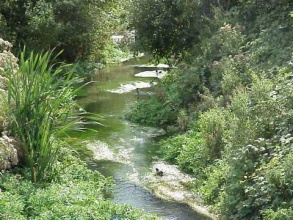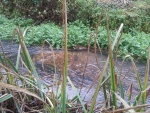Case study:River Wandle Restoration Project: Difference between revisions
No edit summary |
No edit summary |
||
| Line 22: | Line 22: | ||
|Subcatchment=Wandle | |Subcatchment=Wandle | ||
}} | }} | ||
{{Site}} | {{Site | ||
|Name=Butter Hill, Carshalton | |||
|WFD water body code=GB106039017640 | |||
|WFD (national) typology=Low, Small, Calcareous, | |||
|WFD water body name=Wandle (Carshalton Branch at Carshalton) | |||
|Pre-project morphology=Over deepened, Over-widened, Ponded, Straightened, | |||
|Reference morphology=Pool-riffle, | |||
|Heavily modified water body=Yes | |||
|Protected species present=No | |||
|Invasive species present=No | |||
|Dominant hydrology=Flashy, Artificially regulated, | |||
|Dominant substrate=Gravel, Silt, Bedrock, | |||
|Average bankfull channel width category=2 - 5 m | |||
|Average bankfull channel depth category=0.5 - 2 m | |||
|Mean discharge category=1 - 10 m³/s | |||
}} | |||
{{Project background}} | {{Project background}} | ||
{{Motivations}} | {{Motivations}} | ||
Revision as of 14:49, 10 December 2012
This case study is pending approval by a RiverWiki administrator.
Project overview
| Status | Complete |
|---|---|
| Project web site | |
| Themes | Fisheries, Habitat and biodiversity, Hydromorphology, Monitoring |
| Country | England |
| Main contact forename | Tim |
| Main contact surname | Longstaff |
| Main contact user ID | |
| Contact organisation | Wandle Trust |
| Contact organisation web site | http://www.wandletrust.org/ |
| Partner organisations | Environment Agency, Wild Trout Trust |
| Parent multi-site project | |
| This is a parent project encompassing the following projects |
No |
Project summary
Delivered in three phases on the stretch of the Upper Wandle, referred to as the Carshalton arm, between two public parks, the Grove (upstream) and Wilderness Island (downstream). Phase one works comprised weir notching and the creation of woody debris habitat for fish and invertebrates. The second phase focused on further habitat enhancement and weir removal. Phase three works looking at opportunities along the wider Carshalton section and associated maintenance and monitoring of project works continues in 2012, led by the Wandle Trust.
Monitoring surveys and results
Lessons learnt
Catchment and subcatchment
Edit the catchment and subcatchment details
(affects all case studies in this subcatchment)
Subcatchment:Wandle Other case studies in this subcatchment: River Wandle: Butter Hill Phase 3
Site
| Name | Butter Hill, Carshalton |
|---|---|
| WFD water body codes | GB106039017640 |
| WFD (national) typology | Low, Small, Calcareous |
| WFD water body name | Wandle (Carshalton Branch at Carshalton) |
| Pre-project morphology | Over deepened, Over-widened, Ponded, Straightened |
| Reference morphology | Pool-riffle |
| Desired post project morphology | |
| Heavily modified water body | Yes |
| National/international site designation | |
| Local/regional site designations | |
| Protected species present | No |
| Invasive species present | No |
| Species of interest | |
| Dominant hydrology | Flashy, Artificially regulated |
| Dominant substrate | Gravel, Silt, Bedrock |
| River corridor land use | |
| Average bankfull channel width category | 2 - 5 m |
| Average bankfull channel width (m) | |
| Average bankfull channel depth category | 0.5 - 2 m |
| Average bankfull channel depth (m) | |
| Mean discharge category | 1 - 10 m³/s |
| Mean annual discharge (m3/s) | |
| Average channel gradient category | |
| Average channel gradient | |
| Average unit stream power (W/m2) |
Project background
| Reach length directly affected (m) | |
|---|---|
| Project started | |
| Works started | |
| Works completed | |
| Project completed | |
| Total cost category | |
| Total cost (k€) | |
| Benefit to cost ratio | |
| Funding sources |
Cost for project phases
| Phase | cost category | cost exact (k€) | Lead organisation | Contact forename | Contact surname |
|---|---|---|---|---|---|
| Investigation and design | |||||
| Stakeholder engagement and communication | |||||
| Works and works supervision | |||||
| Post-project management and maintenance | |||||
| Monitoring |
Reasons for river restoration
| Mitigation of a pressure | |
|---|---|
| Hydromorphology | |
| Biology | |
| Physico-chemical | |
| Other reasons for the project |
Measures
Structural measures
| |
|---|---|
| Bank/bed modifications | |
| Floodplain / River corridor | |
| Planform / Channel pattern | |
| Other | |
Non-structural measures
| |
| Management interventions | |
| Social measures (incl. engagement) | |
| Other | |
Monitoring
Hydromorphological quality elements
| Element | When monitored | Type of monitoring | Control site used | Result | ||
|---|---|---|---|---|---|---|
| Before measures | After measures | Qualitative | Quantitative | |||
Biological quality elements
| Element | When monitored | Type of monitoring | Control site used | Result | ||
|---|---|---|---|---|---|---|
| Before measures | After measures | Qualitative | Quantitative | |||
Physico-chemical quality elements
| Element | When monitored | Type of monitoring | Control site used | Result | ||
|---|---|---|---|---|---|---|
| Before measures | After measures | Qualitative | Quantitative | |||
Any other monitoring, e.g. social, economic
| Element | When monitored | Type of monitoring | Control site used | Result | ||
|---|---|---|---|---|---|---|
| Before measures | After measures | Qualitative | Quantitative | |||
Monitoring documents
Image gallery
Additional documents and videos
Additional links and references
| Link | Description |
|---|
Supplementary Information
Edit Supplementary Information



